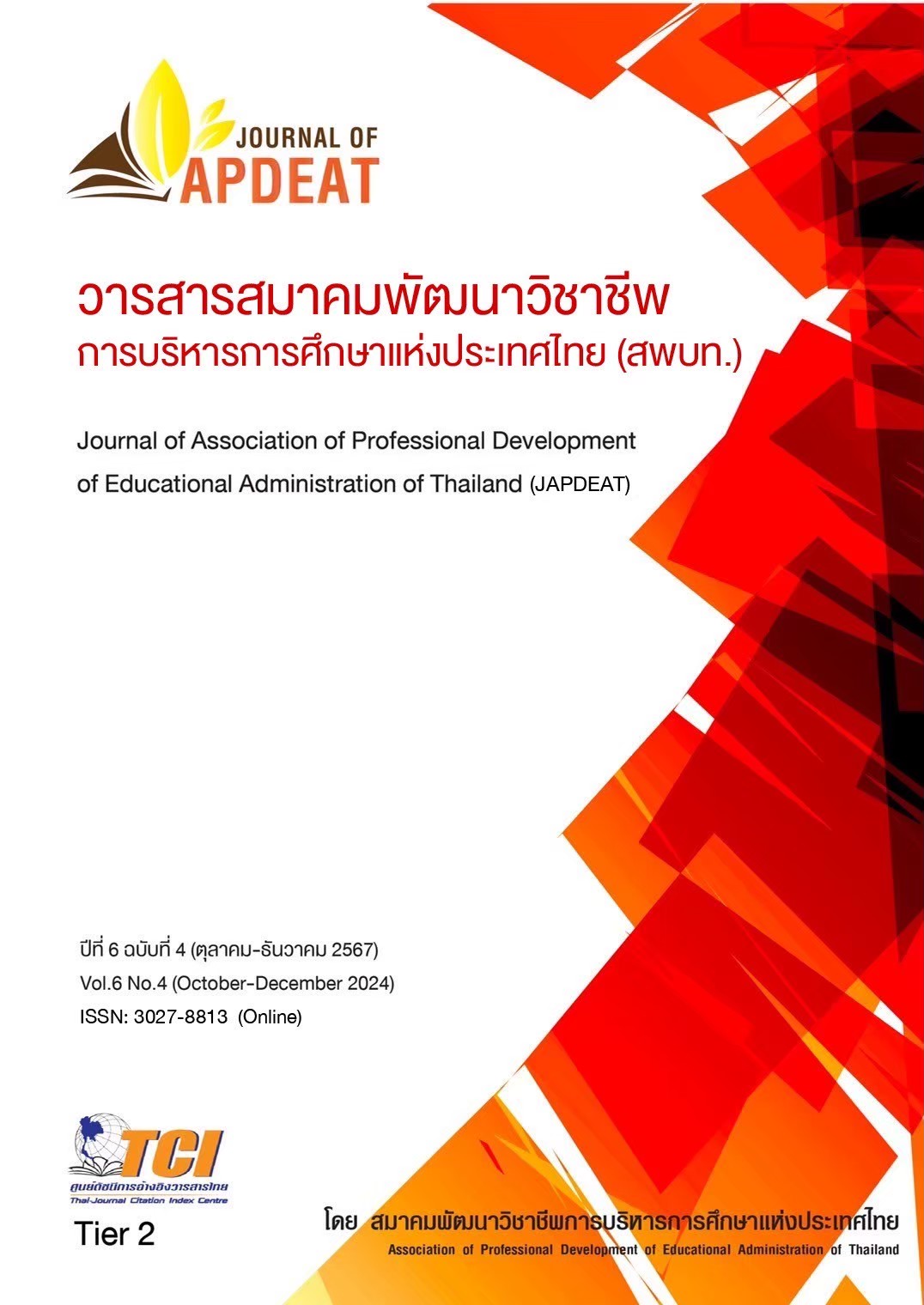Proactive Management Strategies for Developing Learning Management in Social Studies, Religion, and Culture to Adapt to the Changes in the Artificial Intelligence Era
Main Article Content
Abstract
This research aims to propose a proactive management guidelines for development the learning management social studies, religion, and culture to adapt to the changes in the artificial intelligence era. Employing a Community-Based Participatory Research (CBPR) approach, the researchers have designed the study using two key methodologies 1) mixed methods research. Sequential type oriented 2) participatory planning process techniques. The study findings suggest that to develop a proactive management approach for development learning management in social studies, religion, and culture to adapt to the changes of the artificial intelligence era, an assessment of the situation, vision setting, mission definition, goal setting, strategic issues identification, project planning, and strategic planning are necessary. The strategic planning has been outlined according to the New Public Management framework in four aspects under the Balanced Scorecard (BSC) theory. Aspects 1: Effectiveness aspects 2: Service Quality aspects 3: Process Efficiency aspects 4: Organizational and Staff Development All four aspects demonstrate the interconnectedness leading to the success, achievement of objectives, and realization of the vision for managing learning in the domains of social studies, religion, and culture to adapt to the changes brought by the artificial intelligence era.
Article Details
References
คณะกรรมการการศึกษาขั้นพื้นฐาน. (2556). แผนปฏิบัติการประจำปีงบประมาณ 2556. กรุงเทพฯ: สำนักงานคณะกรรมการการศึกษาขั้นพื้นฐาน
ประเวศ เวชชะ. (2565). การวิจัยแบบผสมผสานประเภทลำดับต่อเนื่องเชิงอธิบาย. เชียงราย: มหาวิทยาลัยราชภัฏเชียงราย
ไพรภ รัตนชูวงศ์. แนวทางการบริหารจัดการชั้นเรียนในการจัดการเรียนรู้เพื่อพัฒนาคุณภาพผู้เรียน 4.0 ของโรงเรียนสาธิตมหาวิทยาลัยราชภัฏเชียงราย. วารสารการบริหารการศึกษาและภาวะผู้นำ มหาวิทยาลัยราชภัฏสกลนคร, 7(27), 232-241.
โรงเรียนบ้านป่าแฝ-หนองอ้อ-สันทรายมูล. (2565). รายงานการประเมินตนเองของสถานศึกษา (SAR) ประจำปีการศึกษา 2565. เชียงราย: โรงเรียนบ้านป่าแฝ-หนองอ้อ-สันทรายมูล
สํานักงานเลขาธิการสภาการศึกษา. (2560). แผนการศึกษาแห่งชาติพ.ศ. 2560 – 2579. กรุงเทพฯ: สํานักงานเลขาธิการสภาการศึกษา.
สุดาพร ปัญญาพฤกษ์. (2562). การพัฒนาทักษะในศตวรรษที่ 21 โดยการจัดกิจกรรมการเรียนรู้แบบ Active Learning สำหรับนักศึกษาวิชาชีพครู คณะครุศาสตร์ มหาวิทยาลัยราชภัฏเชียงราย. วารสารศึกษาศาสตร์ปริทัศน์, 34(2) 31-40.
สมศักดิ์ พักวัน. (2556). ปัจจัยที่ส่งผลต่อการจัดการเรียนรู้ที่เน้นผู้เรียนเป็นศูนย์กลาง ในโรงเรียนมัธยมศึกษาขนาดกลาง จังหวัดขอนแก่น. วิทยานิพนธ์ปริญญาศึกษาศาสตร์มหาบัณฑิต . ขอนแก่น: บัณฑิตวิทยาลัย มหาวิทยาลัยขอนแก่น .
Chat GPT. (2566). การศึกษาไทย 4.0 สู่การเปลี่ยนแปลงในยุคปัญญาประดิษฐ์. https://shorturl.asia/3HdoD
Clark D. & Waters D. (2019). The impact of artificial intelligence in education: A systematic review. International Journal of Education and Technology, 33-49.
Covey S. R. (2020). The 7 habits of highly effective people. Simon & Schuster.
Hilary Nixon. (2023). Artificial Intelligence: A History and Future . Beyond Publishing.
Smith J, A. (2020). Proactive Management Strategies for the Modern Workplace. Springer Nature.


